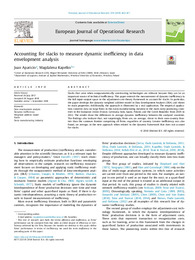Please use this identifier to cite or link to this item:
https://hdl.handle.net/11000/6256Full metadata record
| DC Field | Value | Language |
|---|---|---|
| dc.contributor.author | Aparicio Baeza, Juan | - |
| dc.contributor.author | Kapelko, Magdalena | - |
| dc.contributor.other | Departamentos de la UMH::Estadística, Matemáticas e Informática | es |
| dc.date.accessioned | 2020-09-01T09:57:34Z | - |
| dc.date.available | 2020-09-01T09:57:34Z | - |
| dc.date.created | 2018-09-01 | - |
| dc.date.issued | 2020-09-01 | - |
| dc.identifier.issn | 0377-2217 | - |
| dc.identifier.uri | http://hdl.handle.net/11000/6256 | - |
| dc.description.abstract | Slacks that arise when nonparametrically constructing technologies are relevant because they can be an important source of technical inefficiency. This paper extends the measurement of dynamic inefficiency in the full input–output space in the adjustment-cost theory framework to account for slacks. In particular, the paper develops the dynamic weighted additive model in Data Envelopment Analysis (DEA) and shows its main properties. Additionally, the approach is illustrated by a real application. The empirical applica- tion concerns data on large firms in the dairy-manufacturing industry in the main dairy-producing coun- tries in the European Union (France, Germany, Italy, Spain, Poland, and the Czech Republic) from 2005 to 2012. The results show the differences in average dynamic inefficiency between the analyzed countries. The findings also indicate that, not surprisingly, firms are, on average, closer to their own-country fron- tier than the common frontier comprising all firms, regardless of country. Greater inefficiency was also found, on average, in the new approach when related to the dynamic framework that does not account for slacks | es |
| dc.description.sponsorship | We thank three anonymous referees for providing constructive comments and help in improving the contents and presentation of this paper. Additionally, the authors appreciate the financial support from the Spanish Ministry for Economy and Competitiveness (Ministerio de Economia, Industria y Competitividad), the State Research Agency (Agencia Estatal de Investigacion) and the European Regional Development Fund (Fondo Europeo de Desarrollo Regional) under grant MTM2016-79765-P (AEI/FEDER, UE). | - |
| dc.format | application/pdf | es |
| dc.format.extent | 9 | es |
| dc.language.iso | eng | es |
| dc.rights | info:eu-repo/semantics/openAccess | es |
| dc.subject | Data envelopment analysis | es |
| dc.subject | Dynamic inefficiency | es |
| dc.subject | Weighted additive model | es |
| dc.subject | Slacks | es |
| dc.subject | Dairy manufacturing industry | es |
| dc.subject.other | 517 - Análisis matemático | es |
| dc.title | Accounting for slacks to measure dynamic inefficiency in data envelopment analysis | es |
| dc.type | info:eu-repo/semantics/article | es |
| dc.identifier.doi | 10.1016/j.ejor.2018.08.045 | - |
| dc.relation.publisherversion | https://doi.org/10.1016/j.ejor.2018.08.045 | - |

View/Open:
8-Aparicio_Kapelko_EJOR2019.pdf
582,93 kB
Adobe PDF
Share:
.png)
